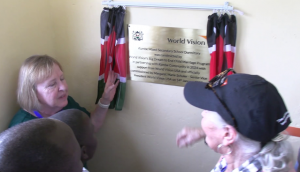The education system in the country is one of the biggest and most crucial sectors that aims to empower the next generation and contribute to the socio-economic aspect through the employment rate.
However, the sector has its own challenges, ranging from infrastructure shortages to delayed capitations and teacher shortages.
Despite this, the government has been working around the clock to address and solve these challenges to provide a conducive learning environment.
Already the government has hired 76,000 Junior secondary schools (JSS) with a target of 110,000 to ensure the new Competency Based Curriculum is addressed.
On the other hand, while the target to construct 16,000 grade nine classrooms at a cost of Sh.18.8 billion has not been achieved yet, the government has so far constructed 10,000 classrooms, with an additional 3,500 being erected through the National Government Constituency Development Fund (NG-CDF). It’s through these challenges that various organisations and churches have been at the forefront since independence to partner with the government to boost the education sector in the country.

For instance, World Vision, which has existed for nearly 50 years in the country, has been in the forefront to partner with both levels of government to address challenges facing the nation. Recently, the organisation helped Kombe Mixed Secondary School to set up a dormitory, a water tank, and an ablution block to drive the education sector in Masaba Ward in Kuria West Sub County.
According to the Senior Vice President of World Vision USA, Margaret Schuler, who commissioned the infrastructure at the Kombe Mixed Secondary School early this month, education is the biggest contributor to solving modern-day challenges.
Schuler said that such partnerships with the country, county, and community will help solve some of the challenges to make a society a better place to live and work.
World Vision Kenya has been implementing the Big Dream Programme to end child marriage and Female Genital Mutilation (FGM) that continue to affect the Migori society.
“This dormitory will help to provide girls with a better and safer place to live and a conducive environment to learn and excel as well as become future economic contributors,” said Schuler.
The official also noted that the various projects being implemented across the country by World Vision in partnership with the government aim to uplift the social and economic activities of the residents as well as address some of the challenges facing less privileged and marginalised individuals.
She explained that the numerous projects being carried out across various countries will help to solve and eliminate negative vices like child marriages, teenage pregnancies, child labour, and FGM to empower the future generation.
Schuler, however, noted that it was the duty of the Kuria community to keep their girls safe, free from negative vices like FGM, to provide good building blocks for the rest of the future communities.

The National Director of World Vision, Gilbert Kamanga Kenya, disclosed that the dormitory will provide a boarding facility that will enable the girls to perform better.
The facility, which was established in Kuria, where the FGM is still practiced, can also act as a safe space for FGM escapees, especially during the December holidays when the vice is high.
“We want to create equal chances for learners, especially in rural areas where numerous challenges like early marriage, teenage pregnancy, and FGM occur to enable girls to pursue their education dreams,” stated Kamanga.
Kamanga explained that World Vision Kenya, which is currently working in 37 counties, down from 42, will continue to work with both levels of government and the community to realise education dreams among the locals to boost student retention and 100 per cent transition.
The organisation has embraced community participation as a key to project implementations among the local community, making it a success story across the country.
“Each community has its challenges, and we try, to the best of our ability, to tackle and address those challenges with a workable collaboration between the two levels of government and the community benefiting,” said Kamanga.
He, however, urged the Kuria community not to hide in retrogressive cultures like FGM, saying that culture is good, but cultures that propagate violence against children are not culture at all.
Kombe Mixed Secondary School Principal Zablon Moseti thanked World Vision for the warm gesture, adding that the 58-girls’ capacity dormitory will help to solve some of the boarding facility challenges.
Moseti called upon more well-wishers and development partners to invest in education in the region to empower the girls’ education to help solve challenges of teenage pregnancies, early marriages, and FGM in Kuria.
By Makokha Khaoya and George Agimba


